13 Best Herbal Tinctures For Blocked Nose
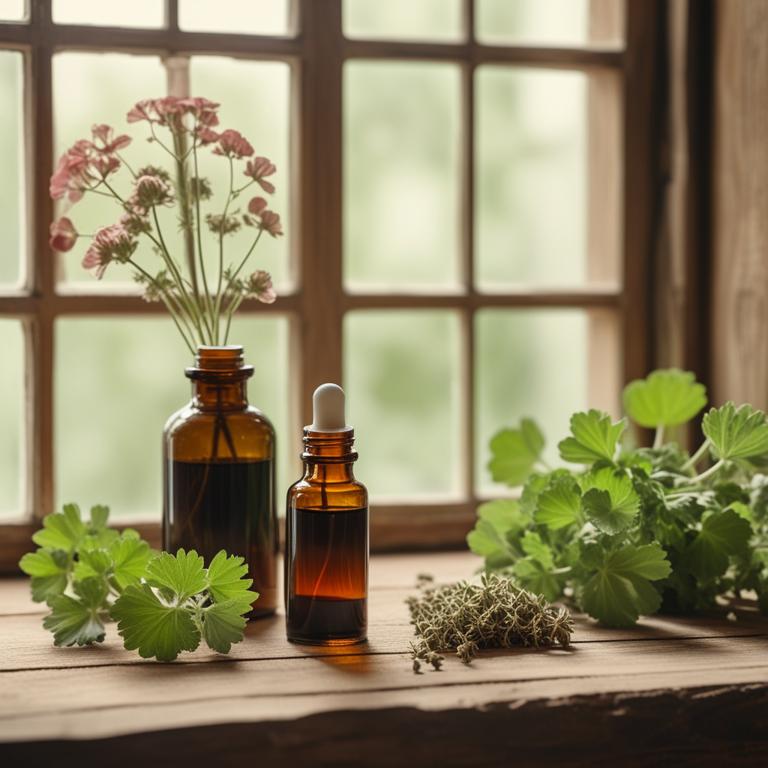
Herbal tinctures for blocked nose are a natural remedy made from concentrated plant extracts, typically in liquid form, used to alleviate congestion and promote nasal breathing.
The benefits of using herbal tinctures to treat a blocked nose include their ability to thin mucus, reduce inflammation, and open up airways, providing quick and effective relief from stuffiness.
Some popular herbal tinctures used to treat a blocked nose include eucalyptus, which helps to break down mucus and relieve congestion; peppermint, which cools and decongests the nasal passages; ginger, which reduces inflammation and promotes circulation; thyme, which has antimicrobial properties to combat infection; and elderberry, which helps to thin mucus and improve respiratory function.
By incorporating these herbal tinctures into your treatment plan, you can enjoy a more natural and sustainable approach to managing a blocked nose.
According to "Turkish archives of otorhinolaryngology", tinctures made from extracts of five medicinal plants, such as those found in Sinulan forte, may be a safe and effective treatment option for blocked nose caused by acute postviral rhinosinusitis.
Below there's a list of the 13 best herbal tinctures for blocked nose.
- 1. Eucalyptus globulus tinctures
- 2. Piper nigrum tinctures
- 3. Cinchona officinalis tinctures
- 4. Echinacea purpurea tinctures
- 5. Rosmarinus officinalis tinctures
- 6. Silybum marianum tinctures
- 7. Glycyrrhiza glabra tinctures
- 8. Zingiber officinale tinctures
- 9. Melaleuca alternifolia tinctures
- 10. Pinus maritima tinctures
- 11. Echinacea angustifolia tinctures
- 12. Thymus vulgaris tinctures
- 13. Foeniculum vulgare tinctures
Also you may be interested in...
TODAY'S FREE BOUNDLE
Herb Drying Checklist + Herbal Tea Shopping List + Medicinal Herbs Flashcards
Enter you best email address below to receive this bundle (3 product valued $19.95) for FREE + exclusive access to The Aphotecary Letter.
$19.95 -> $0.00
1. Eucalyptus globulus tinctures
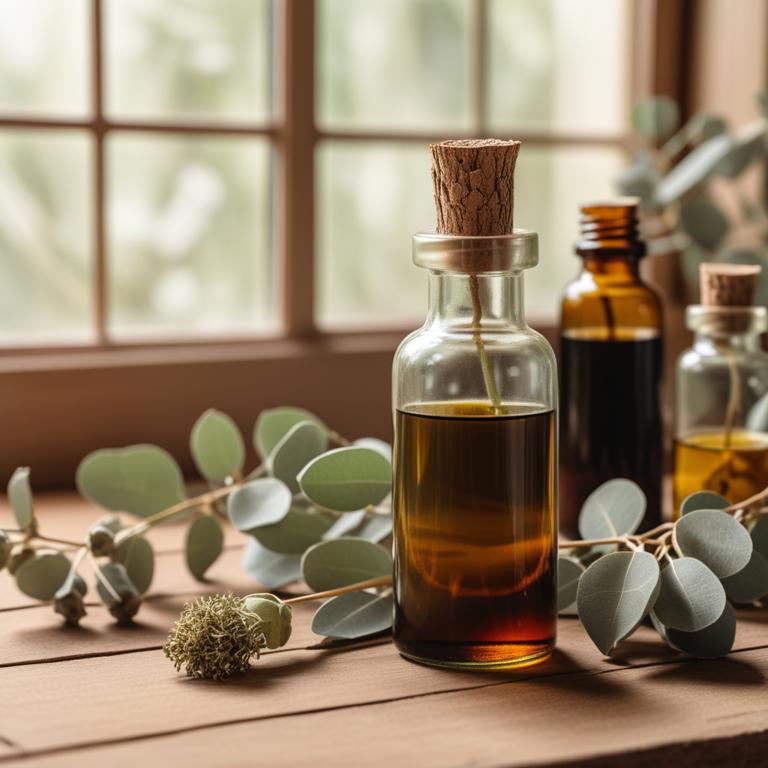
Eucalyptus globulus tinctures have been traditionally used to treat blocked nose ailments due to their decongestant and anti-inflammatory properties.
The tinctures help to treat blocked noses by thinning mucus, making it easier to expel, and reducing nasal congestion.
Bioactive constituents such as eucalyptol and alpha-pinene, which are found in Eucalyptus globulus, contribute to its therapeutic effects by exhibiting bronchodilatory and expectorant properties.
Regular use of Eucalyptus globulus tinctures can provide relief from blocked noses, promote a sense of clearness and freshness in the nasal passages, and help alleviate symptoms associated with respiratory conditions.
Related Study
According to "Evidence-based complementary and alternative medicine: eCAM", Eucalyptus globulus tinctures for blocked nose may be beneficial due to the fact that Eucalyptus globulus was one of the top-cited plant species used in the treatment of respiratory tract infections, including those with blocked nose, in Ethiopia.
2. Piper nigrum tinctures
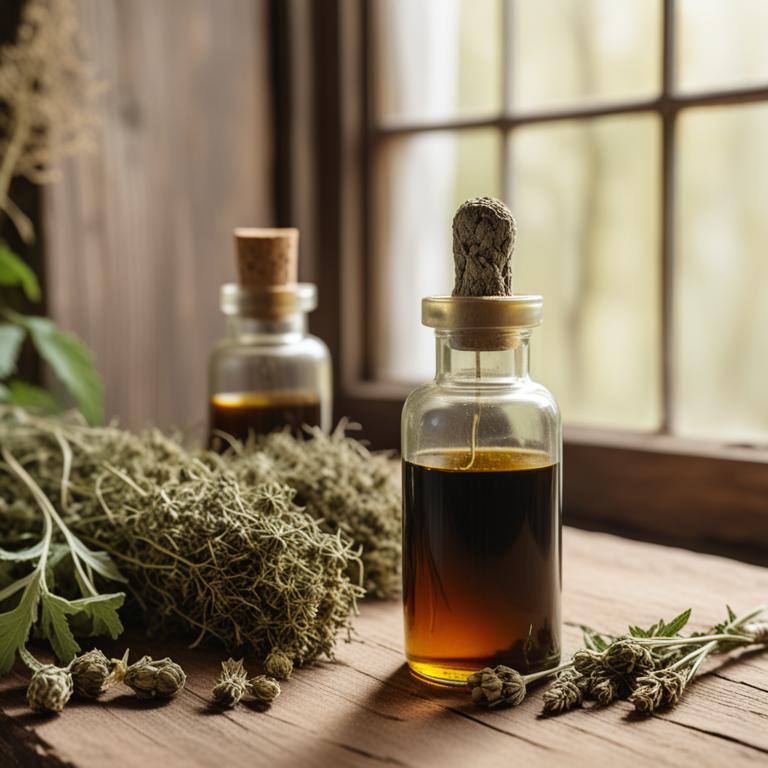
Piper nigrum tinctures have been traditionally used to treat a blocked nose, a common ailment that affects many individuals.
The bioactive constituents of piper nigrum, including piperine and lignans, exhibit potent anti-inflammatory and decongestant properties that help to alleviate nasal congestion.
By stimulating the nasal mucosa and increasing mucus secretion, piper nigrum tinctures help to clear the nasal passages and restore normal breathing.
The benefits of using piper nigrum tinctures for a blocked nose include rapid relief from congestion, reduced inflammation, and a decrease in the risk of complications such as sinus infections.
Related Study
According to "Turkish archives of otorhinolaryngology", Piper nigrum tinctures for blocked nose may be effective as part of the herbal preparation Sinulan forte, which was found to be a safe and effective treatment for acute postviral rhinosinusitis.
3. Cinchona officinalis tinctures

Cinchona officinalis tinctures have been traditionally used to treat blocked nose ailments due to their decongestant and anti-inflammatory properties.
The herbal preparation helps to treat blocked nose by reducing nasal congestion, promoting nasal discharge, and alleviating sinus pressure.
The bioactive constituents, including quinine and quinidine, help to relax nasal muscles and increase blood flow to the nasal passages, thereby relieving congestion.
The benefits of Cinchona officinalis tinctures in treating blocked nose include rapid relief from nasal congestion, improved breathing, and enhanced overall respiratory health.
Related Study
According to "Turkish archives of otorhinolaryngology", Cinchona officinalis tinctures for blocked nose are a component of the herbal preparation Sinulan forte®, which was found to be a safe and effective treatment for acute postviral rhinosinusitis, with significantly lower absolute post-treatment scores for nasal congestion.
4. Echinacea purpurea tinctures

Echinacea purpurea tinctures have been traditionally used to treat a blocked nose, also known as nasal congestion, due to their anti-inflammatory and immunomodulatory properties.
The bioactive constituents of this herbal preparation, including alkylamides and glycosides, help to reduce inflammation and promote the recovery of the nasal mucosa, thereby alleviating congestion and promoting easier breathing.
By inhibiting the production of pro-inflammatory cytokines and promoting the production of anti-inflammatory cytokines, Echinacea purpurea tinctures help to treat a blocked nose by reducing swelling and congestion in the nasal passages.
The benefits of using Echinacea purpurea tinctures to treat a blocked nose include their potential to provide rapid relief, reduce the need for over-the-counter medications, and promote overall immune system health.
Related Study
According to the study, Echinacea purpurea tinctures may offer potential for adjuvant symptomatic therapy in respiratory conditions, including a blocked nose.
5. Rosmarinus officinalis tinctures
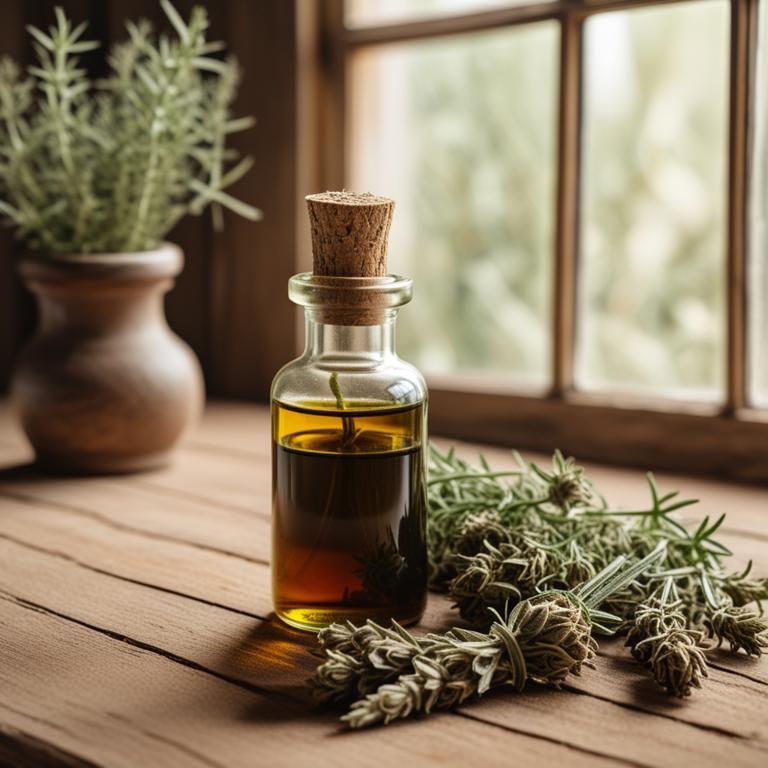
Rosmarinus officinalis tinctures have been traditionally used to treat blocked noses due to their decongestant and expectorant properties, which help to relieve congestion and promote the expulsion of mucus from the airways.
The bioactive constituents of Rosmarinus officinalis tinctures, including camphor, borneol, and rosmarinic acid, contribute to their therapeutic effects by reducing inflammation and relaxing the muscles in the nasal passages.
The use of Rosmarinus officinalis tinctures can provide relief from blocked noses by thinning mucus and making it easier to breathe, making it a popular herbal remedy for respiratory issues.
The benefits of using Rosmarinus officinalis tinctures to treat blocked noses include their natural, non-addictive, and non-invasive nature, making them a safer alternative to over-the-counter decongestants.
6. Silybum marianum tinctures
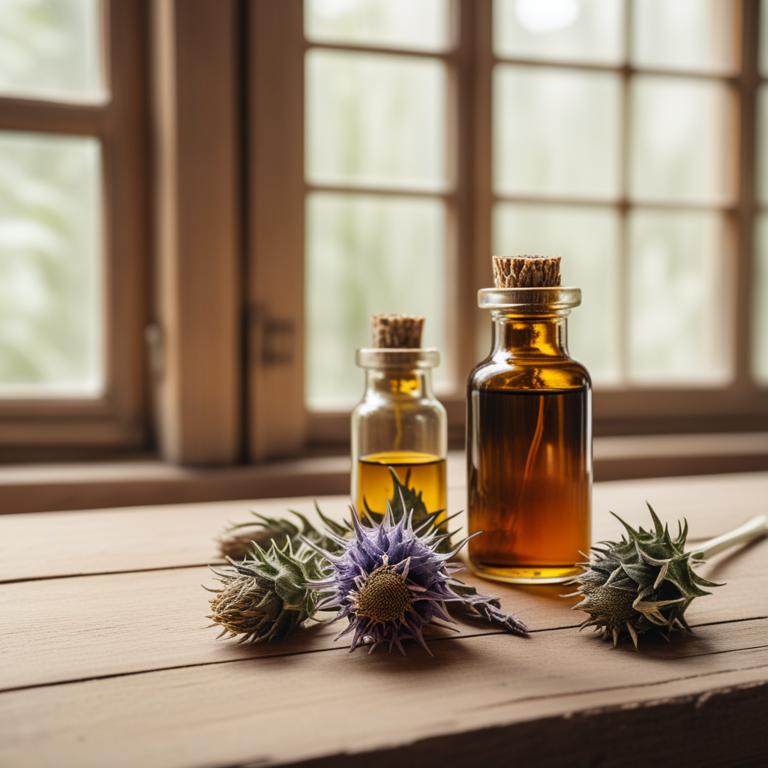
Silybum marianum tinctures, derived from the milk thistle plant, possess anti-inflammatory and expectorant properties that help to treat the blocked nose ailment.
The tinctures aid in relieving nasal congestion by promoting the expulsion of mucus and debris, allowing for easier breathing.
The bioactive constituents, including flavonoids and silymarin, work together to reduce inflammation and modulate the immune response, contributing to improved respiratory function.
By utilizing Silybum marianum tinctures, individuals can benefit from their expectorant and anti-inflammatory effects, thereby alleviating the symptoms associated with a blocked nose.
7. Glycyrrhiza glabra tinctures

Glycyrrhiza glabra tinctures, derived from the roots of the licorice plant, possess anti-inflammatory and expectorant properties that help to treat the blocked nose ailment.
These tinctures work by reducing nasal congestion and promoting the thinning of mucus, making it easier to expel, thereby providing relief from the symptoms of a blocked nose.
The bioactive constituents present in Glycyrrhiza glabra tinctures, including glycyrrhizin and flavonoids, contribute to its therapeutic effects by inhibiting the production of pro-inflammatory enzymes and enhancing the clearance of mucus.
By utilizing Glycyrrhiza glabra tinctures, individuals can benefit from relief from blocked nose symptoms, improved respiratory function, and a reduction in the risk of complications associated with chronic nasal congestion.
Related Study
According to "Turkish archives of otorhinolaryngology", Glycyrrhiza glabra tinctures may be effective in alleviating blocked nose symptoms as part of the herbal preparation Sinulan forte, which was shown to have better relative improvement in nasal congestion compared to mometasone furoate nasal spray in patients with acute postviral rhinosinusitis.
8. Zingiber officinale tinctures

Zingiber officinale tinctures, derived from the rhizome of the ginger plant, possess anti-inflammatory and expectorant properties that aid in treating the blocked nose ailment.
The herbal preparation helps to treat this ailment by reducing nasal congestion, relieving respiratory tract irritation, and promoting the clearance of mucus.
The bioactive constituents, including gingerols and shogaols, exhibit their therapeutic effects by inhibiting the production of pro-inflammatory enzymes and cytokines, thus alleviating nasal congestion and promoting nasal airflow.
Regular use of Zingiber officinale tinctures offers benefits such as improved respiratory function, reduced symptoms of cold and flu, and enhanced overall well-being.
Related Study
According to "Turkish archives of otorhinolaryngology", Zingiber officinale tinctures, which are part of the herbal preparation Sinulan forte®, showed significantly lower absolute post-treatment scores and better relative improvement for nasal congestion in patients with acute postviral rhinosinusitis.
9. Melaleuca alternifolia tinctures
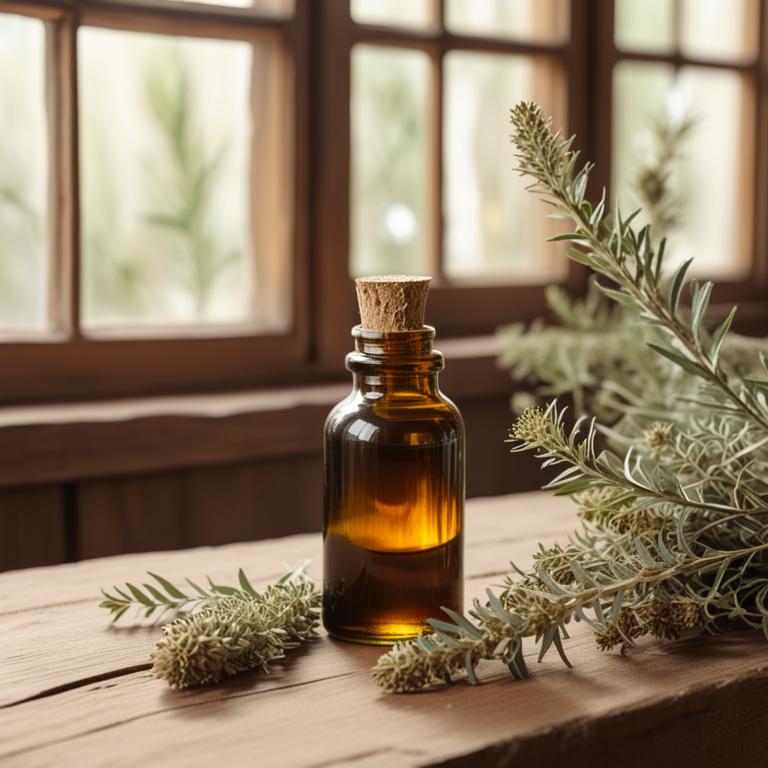
Melaleuca alternifolia tinctures are a natural remedy used to treat blocked noses, and their antimicrobial and anti-inflammatory properties help to alleviate congestion and sinus pressure.
The terpinen-4-ol content in these tinctures has been shown to help reduce nasal congestion by thinning mucus and promoting drainage, thereby providing relief from blocked noses.
Additionally, the bioactive constituents of Melaleuca alternifolia, including cineole and alpha-terpineol, contribute to its decongestant and expectorant properties, helping to clear airways and promote easy breathing.
Regular use of Melaleuca alternifolia tinctures can provide long-term relief from blocked noses and sinusitis, making it a valuable natural remedy for those seeking a chemical-free solution.
10. Pinus maritima tinctures

Pinus maritima tinctures have been traditionally used to treat blocked nose due to their decongestant and expectorant properties, which help to alleviate congestion and promote the clearance of mucus from the respiratory tract.
This herbal preparation helps to treat blocked nose by acting as a natural bronchodilator, allowing for easier breathing and relieving sinus pressure.
The bioactive constituents of Pinus maritima tinctures, including terpenes and phenolic compounds, are responsible for their therapeutic effects, which help to reduce inflammation and combat infection.
The benefits of using Pinus maritima tinctures to treat blocked nose include rapid relief from congestion, improved respiratory function, and a reduced risk of complications associated with prolonged nasal obstruction.
11. Echinacea angustifolia tinctures
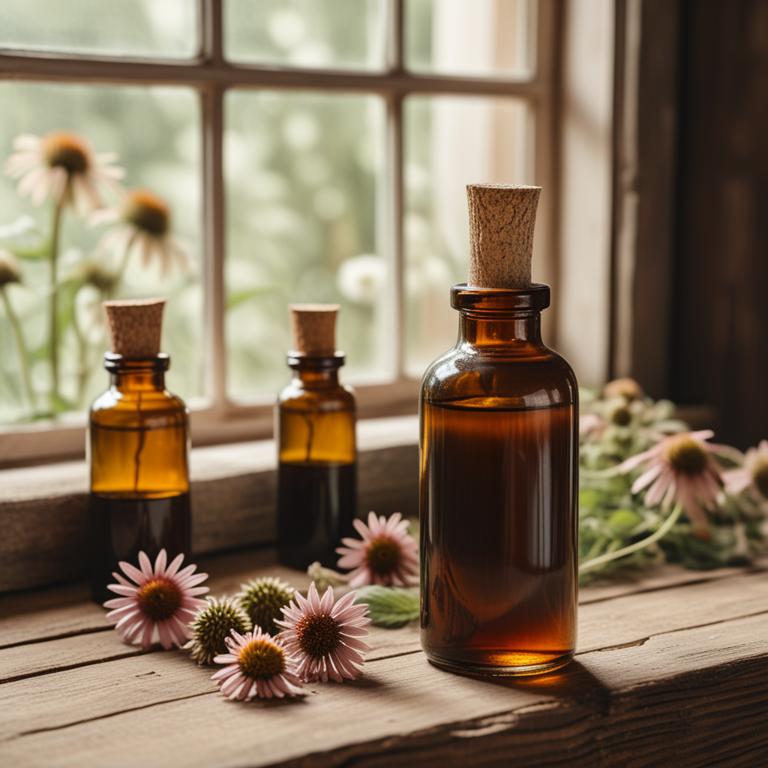
Echinacea angustifolia tinctures have been traditionally used to treat blocked nose ailments, and its properties, such as anti-inflammatory and immunomodulatory effects, help to alleviate congestion and sinus pressure.
The bioactive constituents, including alkylamides and phenolic acids, in this herbal preparation stimulate the immune system, reducing inflammation and promoting mucociliary clearance, which helps to relieve blocked nose symptoms.
By modulating the immune response and reducing inflammation, Echinacea angustifolia tinctures help to treat blocked nose ailments, providing relief from nasal congestion, sinus pressure, and coughing.
The benefits of using Echinacea angustifolia tinctures to treat blocked nose ailments include rapid relief from symptoms, reduced risk of complications, and a non-pharmacological approach to managing respiratory health.
12. Thymus vulgaris tinctures
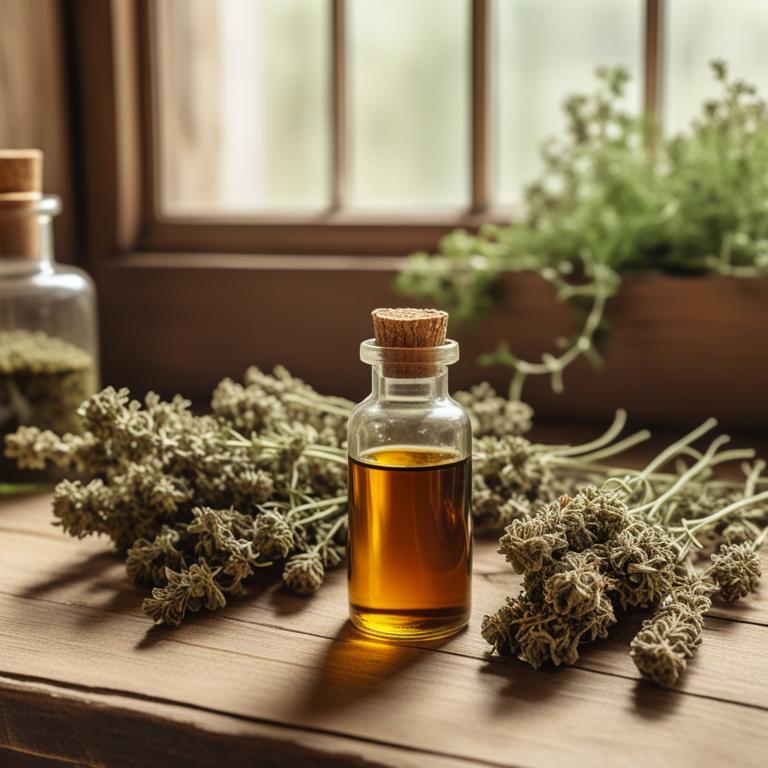
Thymus vulgaris tinctures, derived from the herb thyme, have been used to treat a blocked nose, also known as nasal congestion or sinusitis, due to its decongestant and expectorant properties.
The bioactive constituents of thymus vulgaris, including thymol, carvacrol, and linalool, help to break down mucus and reduce inflammation in the nasal passages, making it easier to breathe.
By increasing blood flow to the sinuses and promoting the drainage of mucus, thymus vulgaris tinctures can provide relief from a blocked nose and alleviate associated symptoms such as congestion and sinus pressure.
The benefits of using thymus vulgaris tinctures to treat a blocked nose include natural and non-addictive relief, improved respiratory function, and reduced risk of complications from prolonged nasal congestion.
Related Study
According to "Turkish archives of otorhinolaryngology", Thymus vulgaris tinctures, which are part of the Sinulan forte preparation, were shown to be effective in treating nasal congestion and other symptoms associated with blocked nose, such as facial pain and loss of sense of smell, with no adverse effects reported.
13. Foeniculum vulgare tinctures
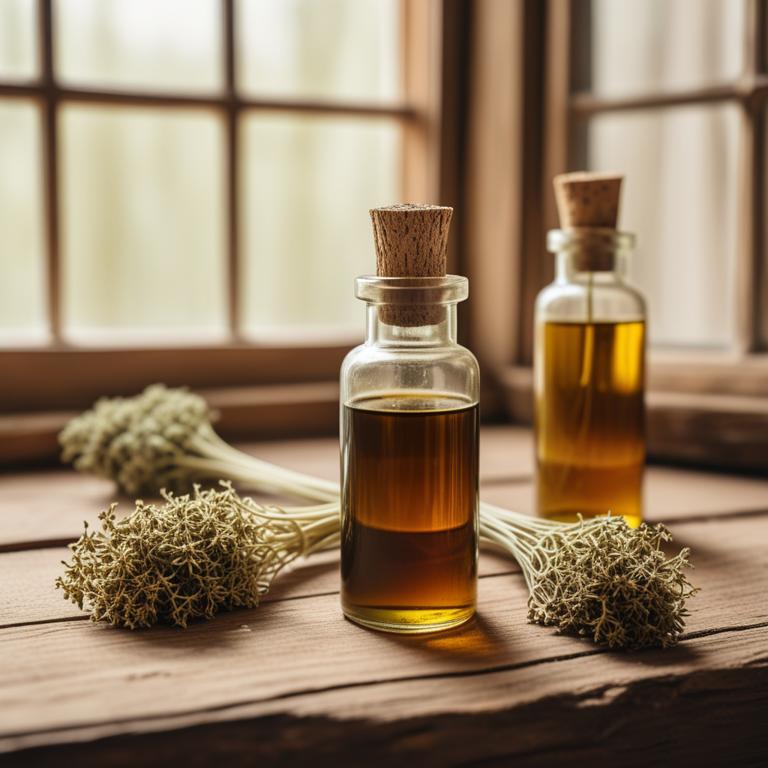
Foeniculum vulgare tinctures, derived from the seeds of the fennel plant, have been traditionally used to treat blocked nose ailments due to their expectorant and anti-inflammatory properties.
The bioactive constituents present in these tinctures, such as anethole, fenchone, and limonene, help to loosen and clear mucus from the nasal passages, reducing congestion and promoting easy breathing.
By stimulating the production of mucus and improving its drainage, fennel tinctures help to alleviate symptoms of a blocked nose, providing quick relief and comfort to individuals suffering from this condition.
The benefits of using fennel tinctures to treat a blocked nose include their natural and non-invasive approach, ease of use, and minimal side effects, making them a popular choice for those seeking a herbal remedy.